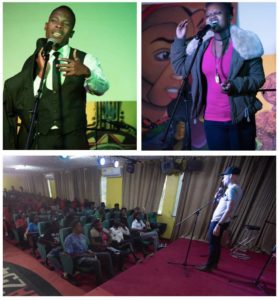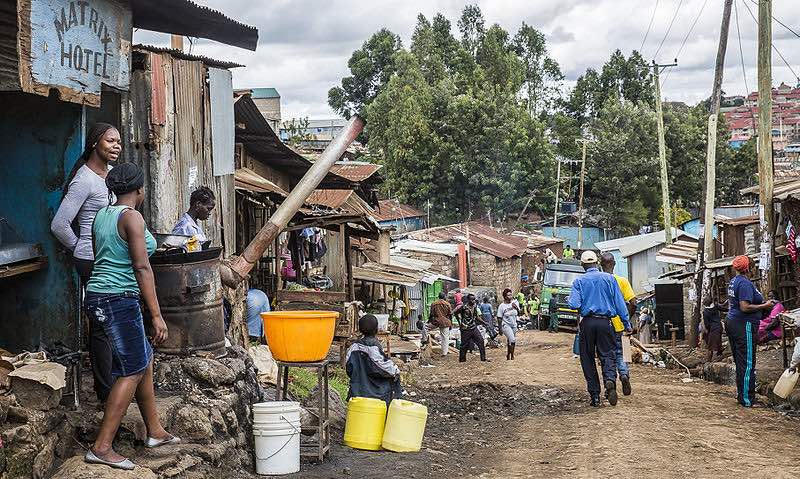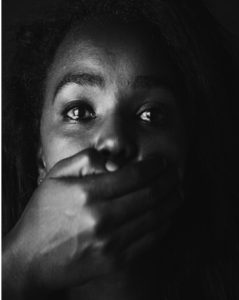I spent two evenings last week at PAWA254, an arts organization in Nairobi working toward a better Kenya through supporting art and activism. I immediately noticed the walls covered in murals of powerful, wise African and African American women, with quotes of their wisdom – Maya Angelou, Wangari Maathai, Harriet Tubman and many names I didn’t recognize.
It was World Poetry Day, and the poets came out to speak in their small, but lovely theater. They came with passion, engagement in life and the use of language as art and tool for social justice. Most of it was in Swahili, but the common use of English words mixed in, combined with the little Swahili that I know (and google translate), I got the gist. On the second night, the guy next to me translated.
By the end of the second night, I had heard a lot of amazing poetry from well over twenty conscious and aware young men, and seven young women. The ratio of men to women was more than 3 to 1.
Half way through that evening, and hearing so few women’s voices, I caught myself off-guard and summoned the emcee. I had a poem I would like to perform. I wrote it there on the spot. As soon as the that poet was done, I was called up.
I stood on the stage of a full theater with an audience who could understand me, but whose mother tongue I cannot speak. I stood up and, with my eyes and demeanor, I asked for permission to speak. In this packed little theater, I could not blend in, I could not be invisible. I had decided to be one more man on the stage that desperately needed the words and wisdom of the women.Yet here I was, a man who looked like those men who came to this land about 150 years ago and stole it, while enslaving the locals who had lived here for tens of thousands of years. These wazungu (white people) stripped them of their own culture and beliefs, and force-fed them religion and subordination.
 Who am I to come here into their space and speak, when they have been forced to listen to men who look like me for generations? Long enough to have so many traditions and ancient knowledge wrested from them, now buried and forgotten. Their education and history books designed by people who look like me. And yet here I was, standing on the stage, asking them to listen to me.
Who am I to come here into their space and speak, when they have been forced to listen to men who look like me for generations? Long enough to have so many traditions and ancient knowledge wrested from them, now buried and forgotten. Their education and history books designed by people who look like me. And yet here I was, standing on the stage, asking them to listen to me.
But I wouldn’t utter a word about race. Frankly, I don’t know enough about it. I still feel lost and confused when I think about it. Not only do I not have answers, I don’t even think I have good enough questions.
I stood, silently on the stage for easily half a minute without speaking a word. It seemed as if everyone was holding their breath.
“This poem… Is called Silence.” And then I was silent for another half a minute.
“Look at me. Look at my anatomy,” I gestured to my penis, “I have spoken. It is time for me to be silent. It is time for me to listen.”
I don’t remember the exact poem after that. I was there, in the moment with the audience. I reiterated that sentiment again, in new words – maybe another 20 words in two minutes of silence. You could hear a pin drop.

Kibera slum Nairobi Kenya, garbage truck
After the event, I stayed and talked to the young men. Mostly men from the slums, Kibera and Mathare and Kiambiu. Boys who have been silenced by society, repressed and forgotten who then found poetry to give them voices they never had. Many grew up with single mothers, who had been silenced. Several told me they don’t know who their fathers are – and can’t ask their mothers because “she gets very upset and angry.”

Photo: Kabatila Kavat Model: Rahel Okbay
These are the men I was asking to make room for the voices of women, yet they were also fighting for their voices to be heard. And some were jumping up to speak on behalf of the women, just like I had done. Yet none of us fought for the space for the women to speak.
One young artist artist, took this photograph in his desire to shed a light on the silencing of women in his community. Some of us a playing this delicate balance of speaking up, while desperately needing to listen… and create the space to listen!
We are missing out! How much wisdom do we men, and society as a whole, loose when we don’t make space to hear the voices that are now silent? We learn so much more when we listen. As this recent viral story from Hilary Jerome Scarsella points out, when we listen, we learn and grow. When we listen, we get to be a guest in someone else’s home.
In order for these old paradigms of gender inequality to break down, we men must not only support the women around us, but actively make the space for them to speak their words – and then step back. It’s a dichotomy that requires a balance – that I feel like I’m failing every day.
These young men who have never uttered the word “dad,” who love their mothers and sisters and want them to be respected, have fought for their voices, but have yet to create a space where women can speak equally. And in my desire to speak to the lack of that space, I walked right into the trap by jumping on stage and speaking.